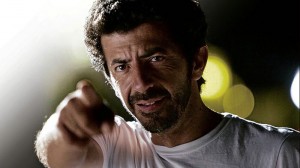Sex, drugs and the World Expo
“The most interesting artworks emerge from turbulent times,” Spanish Ambassador Jorge Domecq said at the recent launch of the “Pelicula” film festival.
His country (Spain) is currently in the midst of socio-political and economic upheavals.
From this rather “tumultuous” era in contemporary European history, a number of equally troubling, thrilling and timely films has emerged. Some of these films will be showcased at the 11th “Pelicula” Spanish and Latin American Film Festival, ongoing at Greenbelt in Makati.
Oscars bet
Centerpiece of the fest is Alberto Rodriguez’s “Grupo 7,” one of Spain’s bets in this year’s Oscars Best Foreign Language Film category.
Article continues after this advertisement“Grupo 7” recounts the story of cops, both corrupt and idealistic, who were tasked to battle with drug syndicates in the years prior to the Seville World Exposition of 1992. The action-packed crime drama features veteran Antonio de la Torre and young hunk Mario Casas.
Article continues after this advertisementAs part of the “Encuentros en el cine” series, Rodriguez will visit Manila to participate in an open forum at Greenbelt Cinema 2 on October 8, 7 p.m.
Before flying to the country, Rodriguez granted the Inquirer an e-mail interview (translated by Instituto Cervantes). He said he’s looking forward to presenting his film in Manila—the first time it will be screened in Asia.
Here are excerpts from the interview:
What was the challenge in making your film?
From the beginning, the main challenge was to recreate the era, the environment, the events, in a realistic manner. I also had to make sure that everything was accurate, without sacrificing the spectacle of the action scenes.
How did you overcome it?
I made sure that everybody could clearly see the film’s point of view. I also kept, or at least tried, to keep my feet on the ground.
Were the characters in “Group 7” based on real people, real cops?
The characters were not based on anyone in particular, but they were inspired by real people who lived on both sides of the conflict—both the police and the small world of drug traffickers.
Did the script entail a lot of research?
Yes, around six months of newspaper research and meetings, along with interviews with resource people. We talked with police officers, prosecutors, judges, defense lawyers, ex-dealers, drug users and journalists.
All the data proved very useful when it was time to write the script. It gave us a sense of security on the set, too.
What led you to this story?
A lawyer-friend lent me a summary of a real drug-trafficking case from that time. It happened just 300 meters from where they were constructing all the emblematic buildings of the 1992 World Expo.
The summary reflected an atmosphere of misery amid such opulence. It was a compelling story, seeing the contrast. Small-time corruption…That was the starting point.
Why is it important for you to tell this story?
I think that the story, and the film in a way, shows an aspect of society that is universal. We tend to look away when we don’t want to see certain things. We tend to forget some civil rights in the name of the greater good.
Let’s think of what happened in London during the last Olympics. Or what’s happening in Brazil, as they prepare for the next World Cup.
I was also interested in the vast contradiction (between affluence and poverty) and the lack of foresight. After the event, the Expo complex was left empty for years. Empty buildings, empty avenues, a ghost town. No one had thought of what to do with that huge investment after the World Expo.
What was the shoot like?
It was extremely hot and difficult. Seville, in the summer, can go up to 45 degrees Celsius…and it did. It was arduous because there were so many complicated action sequences, which we sometimes did for the first time.
What was it like working with the cast?
I always try to rehearse long before shooting begins, yet in this case we only had three weeks. But I am very happy with the cast and crew.
Why did you set the film in the years before the World Expo?
After so many centuries, 1992 marked Spain’s debut in the international scene. We had the Olympics in Barcelona, (while) the Expo in Seville and Madrid became Europe’s cultural capital.
It was as if Spain was being presented to the world as a country determined to be a great power again. For years, that wasn’t discussed. Looking back, it seems ironic. The film speaks of the past, but in a way I think it also talks about the Spain of today.
On the other hand, it’s also the story of Seville, a city with 700,000 inhabitants in the Spanish Golden Age, a capital that served as the entry point of the gold of the Spanish empire. But Seville had lost its luster and wealth. Five hundred years later, to commemorate the discovery of America, some sort of wealth came back. It’s kind of a paradox.
A dark mood pervades in the film. Is this a reflection of the crisis in Europe now?
It’s possible.
What are your hopes for the Manila screening?
I have no idea how the movie will be received in the Philippines. Hopefully, it will do well. I think that the film is relatively universal, although it has a local theme.
What is your next project?
Currently, I am writing a film on a Spanish spy named Francisco Paesa.
(“Grupo 7” also has a screening on October 10, 9:30 p.m.)
